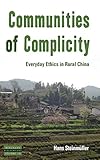Communities of Complicity : Everyday Ethics in Rural China / Hans Steinmüller.
Material type: TextSeries: Dislocations ; 10Publisher: New York ; Oxford : Berghahn Books, [2013]Copyright date: ©2013Description: 1 online resource (290 p.)Content type:
TextSeries: Dislocations ; 10Publisher: New York ; Oxford : Berghahn Books, [2013]Copyright date: ©2013Description: 1 online resource (290 p.)Content type: - 9780857458902
- 9780857458919
- 303.3/720951 23
- online - DeGruyter
| Item type | Current library | Call number | URL | Status | Notes | Barcode | |
|---|---|---|---|---|---|---|---|
 eBook
eBook
|
Biblioteca "Angelicum" Pont. Univ. S.Tommaso d'Aquino Nuvola online | online - DeGruyter (Browse shelf(Opens below)) | Online access | Not for loan (Accesso limitato) | Accesso per gli utenti autorizzati / Access for authorized users | (dgr)9780857458919 |
Frontmatter -- Contents -- List of Illustrations -- Acknowledgements -- Notes on the Text -- Introduction -- Chapter 1 A Remote Place from Three Angles -- Chapter 2 Gabled Roofs and Concrete Ceilings -- Chapter 3 Work Through the Food Basket -- Chapter 4 Channelling Along a Centring Path -- Chapter 5 The Embarrassment of Li -- Chapter 6 Gambling and the Moving Boundaries of Social Heat -- Chapter 7 Face Projects in Rural Construction -- Conclusion Everyday Ethics, Cultural Intimacy, and Irony -- Appendix A Newspaper Report -- Appendix B Expenses for the Construction of a House -- Appendix C List of Money-Gifts and Tasks -- Appendix D Subsidies Given to Three Households -- Glossary -- Bibliography -- Index
restricted access online access with authorization star
http://purl.org/coar/access_right/c_16ec
Everyday life in contemporary rural China is characterized by an increased sense of moral challenge and uncertainty. Ordinary people often find themselves caught between the moral frameworks of capitalism, Maoism and the Chinese tradition. This ethnographic study of the village of Zhongba (in Hubei Province, central China) is an attempt to grasp the ethical reflexivity of everyday life in rural China. Drawing on descriptions of village life, interspersed with targeted theoretical analyses, the author examines how ordinary people construct their own senses of their lives and their futures in everyday activities: building houses, working, celebrating marriages and funerals, gambling and dealing with local government. The villagers confront moral uncertainty; they creatively harmonize public discourse and local practice; and sometimes they resolve incoherence and unease through the use of irony. In so doing, they perform everyday ethics and re-create transient moral communities at a time of massive social dislocation.
Mode of access: Internet via World Wide Web.
In English.
Description based on online resource; title from PDF title page (publisher's Web site, viewed 25. Jun 2024)


